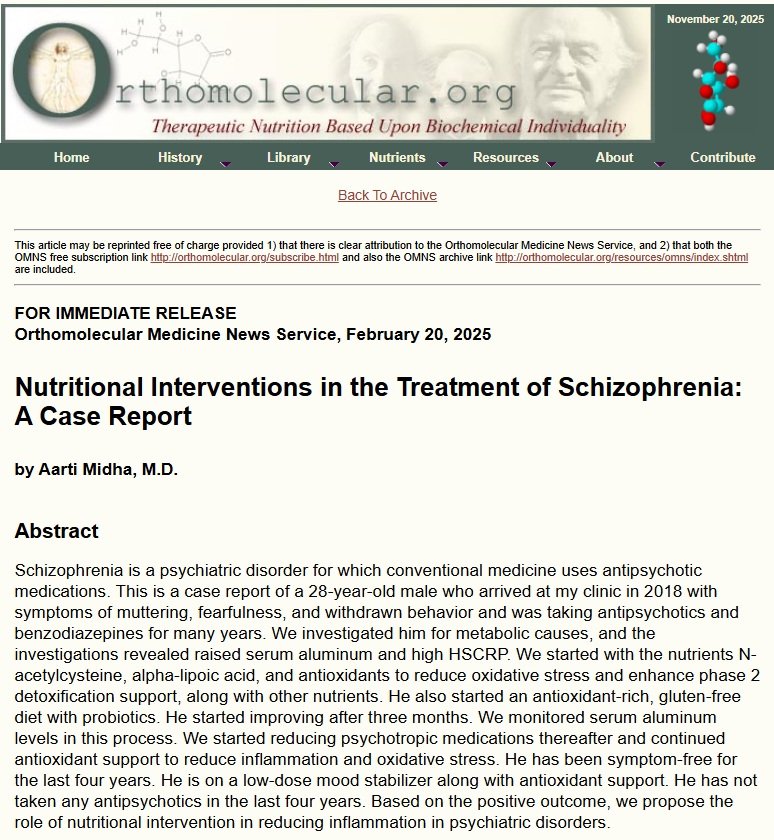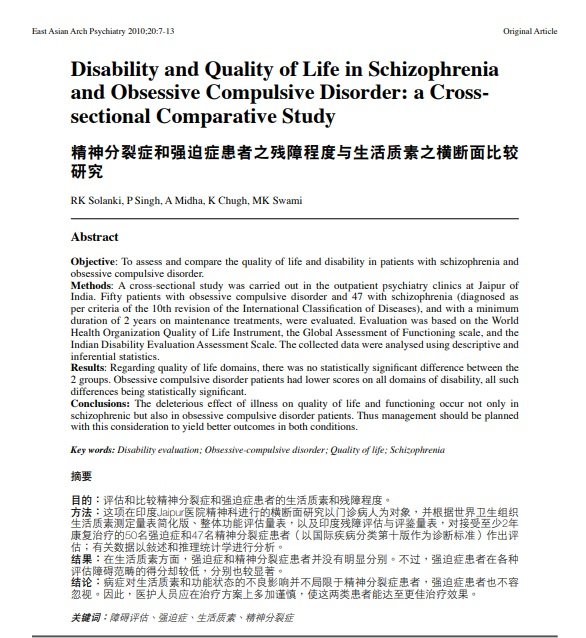Nutritional Interventions in the Treatment of Schizophrenia: A Case Report
By Aarti Midha, M.D.
Schizophrenia is a psychiatric disorder for which conventional medicine uses antipsychotic medications. This is a case report of a 28-year-old male who arrived at my clinic in 2018 with symptoms of muttering, fearfulness, and withdrawn behavior and was taking antipsychotics and benzodiazepines for many years. We investigated him for metabolic causes, and the investigations revealed raised serum aluminum and high HSCRP. We started with the nutrients N-acetylcysteine, alpha-lipoic acid, and antioxidants to reduce oxidative stress and enhance phase 2 detoxification support, along with other nutrients. He also started an antioxidant-rich, gluten-free diet with probiotics. He started improving after three months. We monitored serum aluminum levels in this process. We started reducing psychotropic medications thereafter and continued antioxidant support to reduce inflammation and oxidative stress. He has been symptom-free for the last four years. He is on a low-dose mood stabilizer along with antioxidant support. He has not taken any antipsychotics in the last four years. Based on the positive outcome, we propose the role of nutritional intervention in reducing inflammation in psychiatric disorders. Read More
Nutritional and Antioxidant Therapy Reverses Opioid Dependence and Liver Cirrhosis: A Case Report
By Aarti Midha, M.D., and Pankaj Verma, M.D.
✅ Opioid withdrawal completed in 30 days using integrative nutritional protocols-without relapse.
✅ Liver fibrosis reversed over six months, documented by FibroScan.
✅ Addressed gut-liver-brain axis dysfunction with probiotics, antifungals, and dietary changes.
✅ Corrected deficiencies in taurine, tyrosine, vitamin D3, and magnesium.
✅ Reduced oxidative stress with NAC, alpha-lipoic acid, vitamin C, and glutathione.
✅ Used low-dose medications (metformin, pregabalin, clonidine) to support the transition.
✅ Demonstrates a safe, effective orthomolecular alternative to drug-centered treatment.
🔬 Background
Conventional medicine often isolates liver disease from psychiatric conditions like opioid dependence. But both disorders share root causes and common mechanisms-namely micronutrient deficiency, oxidative stress, gut dysbiosis, and neurotransmitter imbalances. This case report illustrates the reversal of both conditions using a structured integrative plan based on orthomolecular principles. Read More
Disability and Quality of Life in Schizophrenia and Obsessive Compulsive Disorder: a Crosssectional Comparative Study
Objective: To assess and compare the quality of life and disability in patients with schizophrenia and
obsessive compulsive disorder.
Methods: A cross-sectional study was carried out in the outpatient psychiatry clinics at Jaipur of
India. Fifty patients with obsessive compulsive disorder and 47 with schizophrenia (diagnosed as
per criteria of the 10th revision of the International Classification of Diseases), and with a minimum
duration of 2 years on maintenance treatments, were evaluated. Evaluation was based on the World
Health Organization Quality of Life Instrument, the Global Assessment of Functioning scale, and the
Indian Disability Evaluation Assessment Scale. The collected data were analysed using descriptive and
inferential statistics.
Results: Regarding quality of life domains, there was no statistically significant difference between the
2 groups. Obsessive compulsive disorder patients had lower scores on all domains of disability, all such
differences being statistically significant.
Conclusions: The deleterious effect of illness on quality of life and functioning occur not only in
schizophrenic but also in obsessive compulsive disorder patients. Thus management should be planned
with this consideration to yield better outcomes in both conditions.
Key words: Disability evaluation; Obsessive-compulsive disorder; Quality of life; Schizophrenia Read More
Schizophrenia: Impact on quality of life - PMC
The purpose of the present study was to assess quality of life (QOL) in patients with schizophrenia and to determine influence of clinical factors and socio-demographic variables on QOL of schizophrenic patients.
Setting and Design:
Cross-sectional study carried out on outdoor patients attending Department of Psychiatry, SMS Medical College, Jaipur, India.
Materials and Methods:
Fifty patients of schizophrenia diagnosed as per ICD – 10 with minimum duration of illness being two years and attending out patient department (OPD) at psychiatric centre or psychiatric clinic at SMS medical college, hospital, Jaipur, India for maintenance treatment fulfilling the criteria given below were registered. They were evaluated using positive and negative syndrome scale (PANSS) and Quality of Life Instrument (WHO QOL – BREF). The data collected on above tools, was analyzed using descriptive and inferential statistics using Pearson correlation coefficient. Read More



